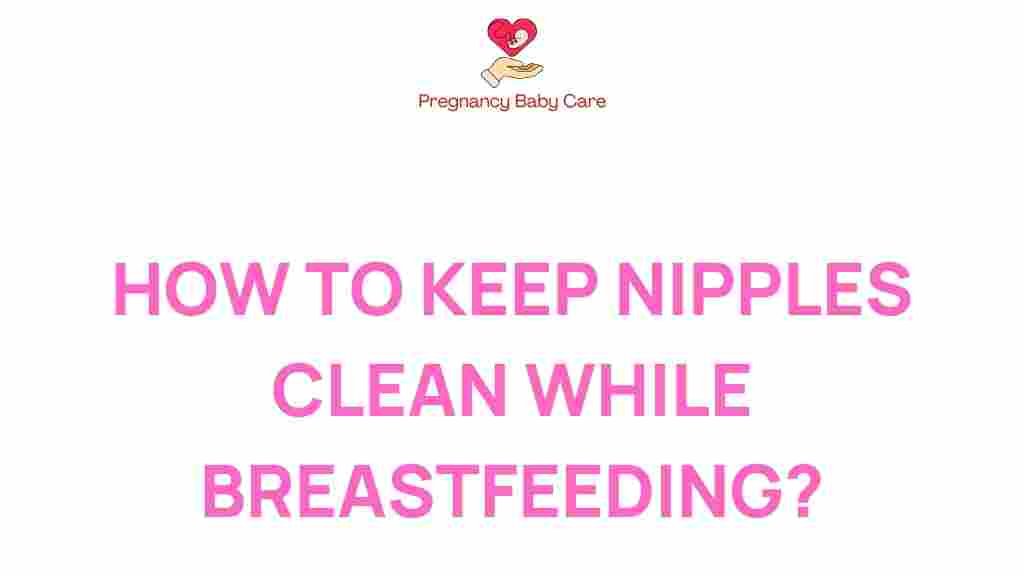The Essential Guide to Keeping Nipples Clean While Breastfeeding
Breastfeeding is a beautiful and natural way to nourish your newborn. However, it also comes with its own set of challenges, one of which is maintaining proper nipple hygiene. This guide serves as an essential resource for new mothers, focusing on breastfeeding, nipple care, and overall hygiene during this important phase of maternal health.
Understanding the Importance of Nipple Care
Nipple care is crucial for nursing mothers. Proper nipple hygiene not only ensures comfort while breastfeeding but also helps in preventing infections and other complications that can arise during lactation. Here are a few reasons why you should prioritize nipple care:
- Prevents Infections: Clean nipples are less likely to harbor bacteria, reducing the risk of infections such as mastitis.
- Enhances Comfort: Proper care can alleviate soreness, cracking, or blistering of the nipples.
- Supports Successful Breastfeeding: Healthy nipples make it easier for both mother and baby to enjoy the breastfeeding experience.
Step-by-Step Guide to Keeping Nipples Clean
To maintain optimal nipple hygiene, follow these step-by-step tips:
1. Wash Your Hands
Before touching your breasts or nipples, always wash your hands thoroughly with soap and water. This reduces the risk of transferring bacteria.
2. Clean Your Nipples
Use warm water and a mild, unscented soap to gently wash your nipples. Avoid antiseptic solutions or harsh soaps as they can irritate the sensitive skin.
3. Dry Gently
After washing, pat your nipples dry with a clean, soft towel. Avoid rubbing, as this can cause irritation.
4. Avoid Moisturizers and Creams
While some suggest using creams or lotions, it’s best to avoid them unless advised by a healthcare professional. They can sometimes lead to build-up or irritation.
5. Let Nipples Air Dry
Whenever possible, allow your nipples to air dry. This can help prevent moisture buildup, which is a breeding ground for bacteria.
Breastfeeding Tips for Nipple Care
In addition to maintaining hygiene, there are several breastfeeding tips that can support nipple health:
- Ensure Proper Latch: A good latch reduces the risk of nipple pain and damage. Consult a lactation consultant if you’re unsure.
- Change Positions: Varying breastfeeding positions can help distribute pressure on different areas of the nipple.
- Feed on Demand: Frequent feeding can prevent engorgement, which may lead to nipple discomfort.
Postpartum Considerations
The postpartum period is a time of significant change. As your body adjusts after childbirth, be mindful of how it affects your nipple hygiene:
- Monitor for Changes: Keep an eye on your nipples for signs of redness, swelling, or discharge, which could indicate an infection.
- Stay Hydrated: Drinking plenty of fluids supports overall health, including skin hydration.
- Seek Support: Don’t hesitate to ask for help from healthcare providers or lactation consultants if you face challenges.
Troubleshooting Common Issues
Even with the best nipple care, some mothers may encounter challenges. Here’s how to troubleshoot common problems:
1. Sore Nipples
If you experience soreness, check your baby’s latch. A poor latch can cause pain. Consult a lactation consultant for assistance.
2. Cracked Nipples
Use a few drops of your breast milk to coat the cracked area, as it has natural healing properties. If the problem persists, consider seeking professional advice.
3. Engorgement
To relieve engorged breasts, try feeding more frequently, using cold compresses, or expressing milk to reduce pressure.
Conclusion
Maintaining proper nipple hygiene is a vital aspect of successful breastfeeding. By following these guidelines for nipple care and understanding how to troubleshoot common issues, you can enhance your breastfeeding experience and support your maternal health. Remember, every breastfeeding journey is unique, and seeking help when needed is key. For more information on lactation and breastfeeding tips, you can visit this resource.
For mothers who are starting their breastfeeding journey or those who are in the postpartum phase, taking care of your nipples is essential. With the right approach to hygiene and care, you can enjoy the rewarding experience of breastfeeding your newborn.
For additional support and resources, consider checking out external breastfeeding support networks that can provide further assistance and community.
This article is in the category Feeding and created by PregnancyBabyCare Team
